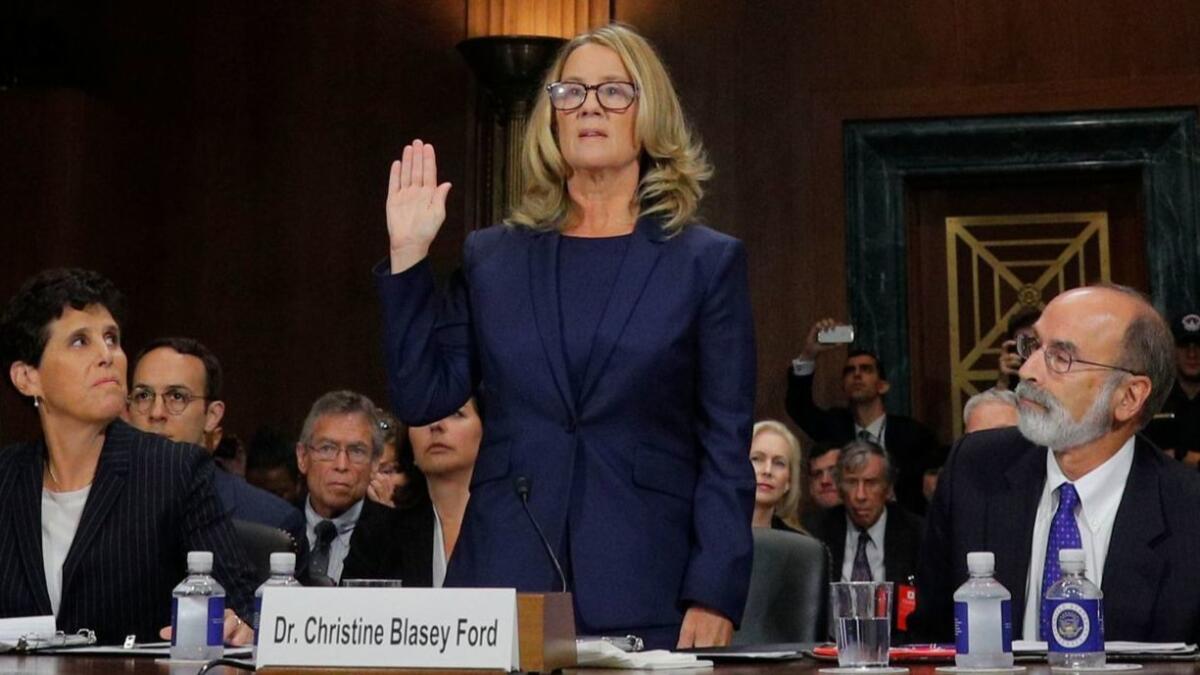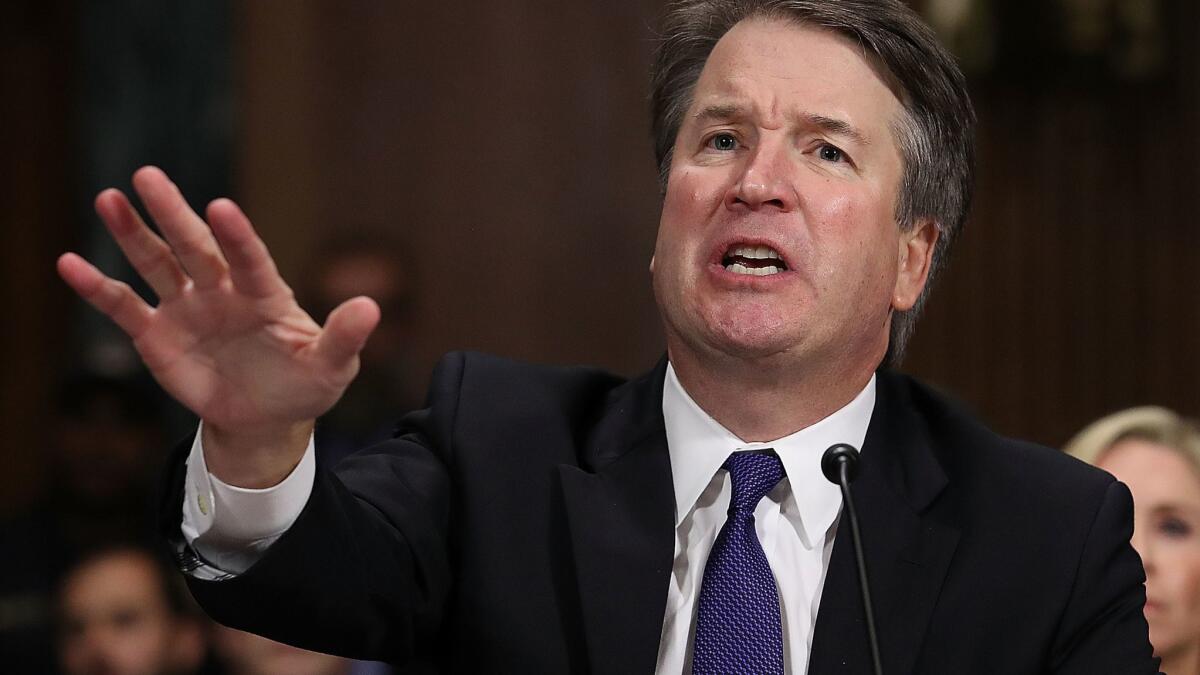Must Reads: Here’s what experts who study sexual violence say about the credibility of Christine Blasey Ford’s testimony

Christine Blasey Ford, who has accused Supreme Court nominee Brett M. Kavanaugh of sexually assaulting her in high school, testified before the Senate Judiciary Committee on Thursday.
- Share via
What Christine Blasey Ford remembers best about that night 30-plus years ago is the laughter.
It came, she said, from Supreme Court nominee Brett Kavanaugh and his friend Mark Judge — two high school boys who drunkenly locked her into the bedroom of a friend’s house where she was sexually assaulted by Kavanaugh.
In testimony Thursday to members of the Senate Judiciary Committee, Ford described it as “uproarious laughter” shared by friends who were “having fun at my expense.” The memory of it is “indelible in the hippocampus,” she said, channeling her training as a research psychologist.
Other aspects of that night are seared in her memory as well: the bed on the right side of the room where the alleged attack occurred; the sound of the boys “pinballing” their way down the stairway after Ford had locked herself in the bathroom; the sparsely furnished living room she passed as she exited the house.

Yet there are also significant gaps in her memory, including how she made her way home in her traumatized state.
To some members of the committee, those missing memories cast doubt on all of Ford’s allegations. But should they?
In an effort to assess her credibility — and by implication, that of Kavanaugh — The Times asked experts in sexual trauma whether Ford’s testimony was consistent with the research findings and clinical observations they have made or encountered in their own work.
Here’s what they told us.
Patricia Resick, professor of psychiatry and behavioral sciences, Duke University
Who she is: Resick is a leader in the field of sexual trauma. Her research focuses on the lasting effects of traumatic events, particularly on women. She has worked with rape victims for more than 40 years, and since the 1980s, she has been developing and testing cognitive process therapy as a treatment for post-traumatic stress disorder.
What’s your overall reaction to Christine Blasey Ford’s testimony?
I am not her therapist and have not met with Ford personally. I am reacting based on my experience with sexual assault survivors.
She said she doesn’t remember where it took place. That rings true because until you know you are in danger, there is no reason to remember everyday details.
Another thing that rings true is that Ford was clearly emotional when talking about the details of the assault. She says it drastically changed her life, and that she was too embarrassed to tell her parents that she was at a house drinking with boys.
Do you find it strange that she didn’t report the assault at the time?
She says that she tried to ignore the assault because it made her anxious. Avoidance is a typical response and part of PTSD. She tried to push the event away and not think about it.
Were there details that stuck out to you?
The discussion about Ford and her husband going to therapy because she wanted two front doors was a unique moment. It actually is corroborating evidence about the impact of the assault on her life. I mean, who else needs two front doors?
There were several emotional moments during her testimony. What did those say to you?
When Sen. Patrick Leahy (D-Vt.) congratulated her on her bravery, she looked like she was going to cry. The same thing happened when Sen. Dick Durbin (D-Ill.) praised her. When Sen. Richard Blumenthal (D-Conn.) called her testimony “powerful,” again, she looked teary. After lunch Sen. Cory Booker (D-N.J.) talked about her sacrifice and bravery. She cried again.
In all of these cases, she was overwhelmed by the praise she was receiving. Given how hard this has been for her to do, I think she was surprised by the praise. I expect her self-esteem has been so damaged that she has trouble taking in all the positive statements praising her.
Although there were gaps in her memory, there were things she recalled with extreme clarity. Does that signal anything?
Her strongest memory of the event was the boys’ laughter. She remembers “two friends having a really good time with each other.”
This speaks to the humiliation and shame that sexual assault victims feel. The shame and humiliation are often more important than the fear and speak more to why she stayed silent for so long.
Tracey J. Shors, distinguished professor of behavioral & systems neuroscience at Rutgers University
Who she is: Shors is a neuroscientist who studies memory and its role in overcoming trauma, including sexual violence. She has devised neuroscience-based treatments for PTSD. Her work also examines how stressful events in the past affect behavior and mental health in the future, especially in women.
Were there aspects of her testimony that are typical of sexual assault survivors?
In our studies, we show that women with sexual violence experience often have many symptoms of anxiety and depression and trauma. Clearly, Ford is a poised and intelligent person with sophisticated knowledge and insight into her own mind. But you can also tell that this is not easy for her.
Did anything strike you about the things Ford remembers from the night of the alleged assault?
It is interesting to me that Ford says she remembers the context and the layout of the bedroom, the bathroom where she hid and the stairwell to the room. We just published a study showing that women with sexual violence history experience vivid memories of the spatial and temporal context of their most stressful life event.
What else does her account tell you about memory?
The brain is always encoding memories, most of which we could not necessarily be able to recall years or decades later. Otherwise, we would remember every time and every place we ever parked our car.
But we do tend to remember stressful events. We do this because we need to use those memories to help us survive now and in the future. Memories are not there just for reminiscing — they are vital for our survival.
It is also important to realize that the people at the party who were not assaulted or stressed by the event are not as likely to remember it. For her, it was a memorable event; for them, it may have just been another time hanging out with few friends hanging at a house. This applies to the people downstairs but perhaps even for the two boys, especially if they were intoxicated.
Sherry Hamby director of the Life Paths Appalachian Research Center
Who she is: Hamby is a licensed clinical psychologist who has studied violence for more than 20 years. She helps conduct the National Survey of Children’s Exposure to Violence for the U.S. Justice Department. She is also a research professor of psychology at the University of the South.
In watching this testimony, what resonated for you and why?
There were many powerful moments in her testimony, but one that will stay with me is the way, with quavering voice, she described them laughing at her while they were violating her consent. It fits a textbook definition of callousness and objectification.
What do you make of the gaps in Ford’s memory?
Humans don’t record events the way that cameras do. Most days we might commit few events to long-term memory.
Traumatic memories are different. Our brains are being flooded with chemicals such as cortisol and norepinephrine that can “sear” events in the way that Ford described.
We remember dangerous and traumatic events better than other events because it has survival value to remember them. However, she didn’t know beforehand that an assault was going to happen, and so there’s no reason to think that the earlier events of the day — or even what happened once she had gotten away — would be seared in her memory the way the assault itself was.

I have seen a few commentators express surprise that she could remember details such as having his hand held over her mouth but not remember the date or the time. That is truly ridiculous. Victims are in survival mode during these events. Dates and times are irrelevant constructs when you are fighting for your life.
These factors are also the reason why no one else at the party would remember it in any detail. It was just “normal time” to them — no norepinephrine, no cortisol, no danger. This whole event may have been pretty routine for Kavanaugh in a lot of ways, and it may not have been seared in his memory in the way it was in hers.
What about the fact that she remembers the laughter so clearly?
The way she said that the laughter stuck in her mind makes sense. Shaming and humiliation can be just as damaging as physical assault, and linger long past when bruises and broken bones are healed.
Did you find her account believable?
She gave one of the most credible accounts I have ever heard from a victim.
The “victim” label is very stigmatizing and associated with stereotypes of passivity and weakness. Ford departed from those stereotypes in important ways. She is an accomplished psychologist, professor and researcher, and I was glad to see those accomplishments presented at the beginning of the hearing. Not only that, but you could also see her expertise throughout her comments. She was very brave and a role model for all survivors.
Despite her strength, you can see the lingering effects of her victimization — how it has affected her for years, and how, even more than 30 years later, it is difficult to talk about.
Any other reactions?
I would also say one more thing regarding this memory issue. If the reports about Kavanaugh’s extensive binge-drinking are true, then that would raise questions about his ability to assert what he did and did not do while he was drinking. That could also explain why he might not have specific memories of these events.
Kevin Swartout, associate professor of psychology at Georgia State University
Who he is: Swartout is an expert on the social attitudes and behaviors that contribute to sexual violence, especially against women. Among other things, he studies how alcohol, drugs, peers and social attitudes can fuel aggressive behavior. One of his specialties is understanding how young men — those a year or two older than Kavanaugh was at the time of the alleged assault — negotiate the transition to college.
How do you assess the credibility of the claims made by these two witnesses?
First of all, let me caution that it is impossible for me to determine how credible the accusations are against Kavanaugh. All I can do is speak to the match between the details that were presented during the hearing and what we know about sexual violence perpetrators from the research literature.
Having stated that, there were several moments from Kavanaugh’s testimony that especially caught my attention.
He demonstrated a great deal of hostility during the hearing, especially toward some of the female senators on the committee. He had a contentious exchange with Sen. Dianne Feinstein (D-Calif.) at the outset, where he cut her off mid-sentence numerous times. There was also the exchange with Sen. Amy Klobuchar (D-Minn), which he later apologized for, where he seemingly tried to flip the power differential by turning the question back on her.

The results of hundreds of studies to this point suggest that levels of hostility toward women, which includes a drive to exert power over women, are positively related with levels of sexual violence.
Do attitudes like that, and their ability to predict behavior, remain pretty stable over a person’s lifetime?
Across several studies, I have found consistent evidence for a group of young men who perpetrate the type of sexual violence described in these allegations, but only at a relatively young age — about 14 to 20 years old. These men then stop perpetrating altogether either before or shortly after they begin college.
This is part of a more general trend researchers have identified regarding adolescent antisocial behavior that disappears once an individual reaches adulthood.
Based on my research, 70% to 75% of young men who perpetrated sexual violence only do so during a relatively limited time frame. Very few of the men who commit sexual violence are serial offenders, so I was not surprised by the idea that these behaviors were limited to adolescence.
These interviews have been edited for length and clarity.







